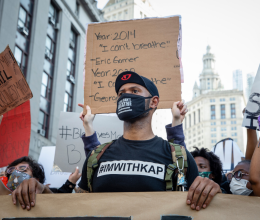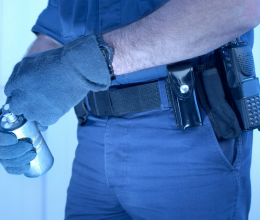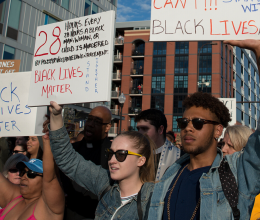
December 8, 2014. Charleston, SC. Post & Courier. Editorial. Outfitting police officers with body cameras could resolve many disputes about their actions. That sounds particularly inviting considering the continuing, divisive debate about the details of Ferguson (Mo.) Police Officer Darren Wilson's fatal shooting of 18-year-old Michael Brown in August.
But adding cameras to every police uniform also sounds potentially costly - and not just in monetary measure.
Still, last week state Sens. Marlon Kimpson, D-Charleston, and Gerald Malloy, D-Hartsville, pre-filed a bill mandating that all law enforcement officers in South Carolina wear body cameras while performing their official duties.
The notion of a camera on every police officer recording every move he or she makes - and every move made by others in that device's range - raises serious questions. Among them:
How, when and where will the cameras be used? How long will they be on? Who will turn them on and off? Who will have access to what they record?
And yes, who will pay for the cameras and the expenses that accompany their use?
State Rep. Wendell Gilliard, D-Charleston, proposes covering some of that cost from the proceeds of auctions of assets seized from criminal suspects.
However, civil forfeiture of property prior to conviction for a crime is an increasingly discredited overreach all too often used in the War on Drugs.
As Brad Cates, a former director of asset forfeiture programs at the Justice Department, recently told The Washington Post: "All of this is fundamentally at odds with the U.S. Constitution."
As for President Barack Obama's pitch for $263 million in federal funding over three years to upgrade police training and equipment across the nation, the $75 million it would include for body cameras would cover only half of their cost for about 50,000 officers.
The president announced his plan last Monday during a break in meetings with Cabinet members and officials from law enforcement agencies and civil rights organizations.
He rightly pointed out the deep mistrust many black Americans have in the police, explaining: "This is not a problem just of Ferguson, Missouri. This is a national problem."
Yet is widely expanding the use of police body cameras a practical part of the solution?
Yes, the cameras are already rising in use across the nation, including in our community.
From a story on The Post and Courier's front page last Tuesday:
"The Charleston County Sheriff's Office has employed cameras on its jailers since the new Cannon Detention Center opened in 2010, and they have helped iron out the details of certain incidents. But like in-car cameras, they cannot be seen as the tell-all technology, Sheriff Al Cannon said."
Sheriff Cannon also warned that most of the funding for police cameras would have to come from local governments.
Beyond that bottom line, though, lie other important concerns. Victoria Middleton, executive director of the American Civil Liberties Union of South Carolina, correctly insisted in comments to our reporter that guidelines on their use will be essential to protect people's privacy rights - including a prohibition on officers turning the cameras on and off in some instances.
And in an era when electronic monitoring of everyone is increasingly omnipresent, there is a creepy Big Brother feel to the concept of every police officer wearing a body camera.
Yes, elected - and law enforcement - officials must consider the benefits of those devices.
But as they craft proper policies for their use, they should also fully ponder not just their financial costs, but their implications for basic American freedoms.



